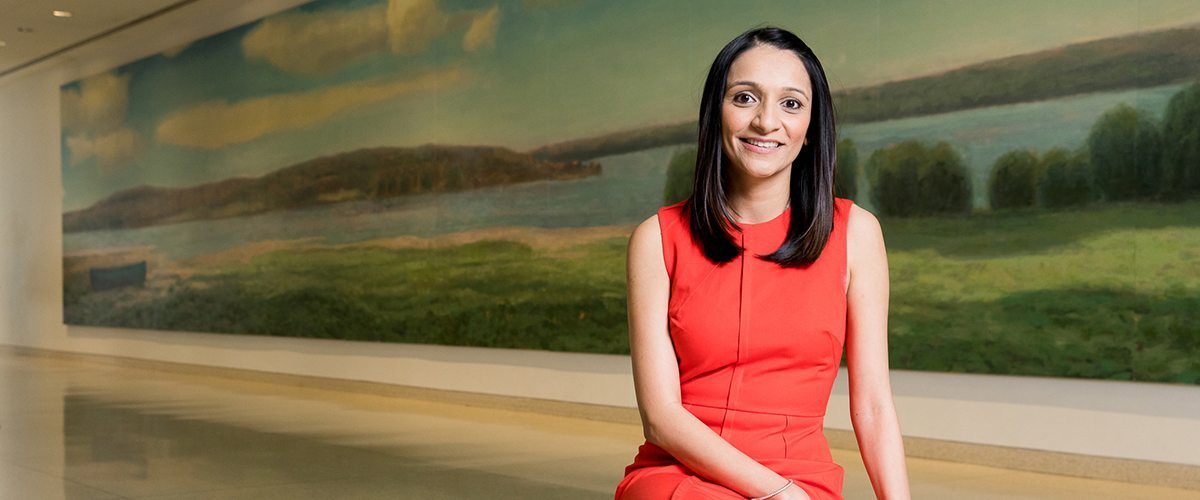Inside NYP: Dr. Nisha Jhalani
The director of clinical and educational services at the Center for Interventional Vascular Therapy on educating women about what it takes to have a healthy heart — and a healthy life.

I have been blessed with phenomenal mentors my entire life, starting with my science-whiz father, who, when I was growing up in New Jersey, always made my homework more complicated than it needed to be.
My love of science continued in college, where I was pre-med and where I also became interested in women’s studies. One of the issues that interested me was how women like myself could become empowered to pursue careers in male-dominated fields — like cardiology. One way I have tried to make a difference is by encouraging female high school students to enter the STEM fields.
I fell in love with cardiology in medical school. What I love most is the instant gratification factor, something you rarely find in medicine. In cardiology, patients sometimes come into the ER on death’s doorstep. Because of the power of the medications and treatments we now have, within a few days most can go home to their loved ones and lead a fully functional life.
I think women often worry that pursuing certain fields won’t allow them to have a fulfilling home life. But the mentors I had during my medical training at NewYork-Presbyterian/Weill Cornell Medical Center — where I did my internship, residency, and fellowship — taught me that being a cardiologist does not mean you can’t have a family. My program director was a phenomenal cardiologist and educator who had three children — she was exactly who I wanted to be. And the message I got throughout my training was to never apologize for wanting to have a family life. There’s no reason to feel guilty. I currently have a 3-year-old and a 6-month-old who keep me incredibly busy and happy. It’s possible to do both well.
That is a message I hope to pass on to the next generation of medical students and trainees so they are not deterred from fields like cardiology. I hope to see more and more young women join the field.
Women’s heart health has always been one of my passions. What most people don’t realize is that heart disease is not only the No. 1 killer of men — it’s also the No. 1 killer of women. Yet even in medical school, students are still being taught that it’s a predominantly male disease. Simply being male is listed as a risk factor. The truth is that women are at just as great a risk for heart disease as men, and they are more likely to die of a heart attack than men. The difference is that for women, the risk comes later in life, after menopause. Conditions that occur during a woman’s pregnancy, such as gestational diabetes and preeclampsia, greatly increase the risk of heart disease in the future.
One of my goals is to empower women to talk to their doctor about their heart health and their family history, and to make sure they are screened for risk factors as early as age 20. In 2015, I launched the Women’s Heart Health Initiative as part of my work with the Cardiovascular Research Foundation (CRF) to raise awareness about heart disease through free educational seminars. It is the responsibility of the medical community to get the information out there so women can take control of their heart health. My goal is to get a movement going. Education is part of the answer, but the other part is encouraging action. In the past year, the CRF has offered yoga and meditation programs as well as group spin classes. The vast majority of cardiac events can be prevented by making healthy lifestyle changes. That’s why this type of education is so crucial.
Dr. Nisha Jhalani is the director of clinical and educational services at the Center for Interventional Vascular Therapy at NewYork-Presbyterian/Columbia University Irving Medical Center and an assistant professor of medicine at Columbia University Vagelos College of Physicians and Surgeons. She received her medical degree from the University of Medicine and Dentistry of New Jersey and completed her residency in internal medicine and fellowship in cardiovascular diseases at NewYork-Presbyterian/Weill Cornell Medical Center. She is board certified in internal medicine, cardiovascular diseases and echocardiography. Her clinical interests include preventive cardiology, personalized cardiovascular risk assessment and women’s heart health.
